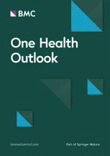
One Health Outlook
Scope & Guideline
Fostering interdisciplinary dialogue for a healthier planet.
Introduction
Aims and Scopes
- Interdisciplinary Research:
The journal supports research that bridges multiple disciplines, including veterinary science, human medicine, environmental science, and social sciences, to address health issues that span across these domains. - Zoonotic Disease Surveillance and Control:
A significant focus is on understanding and controlling zoonotic diseases, which are diseases that can be transmitted between animals and humans, particularly in the context of global health security. - Antimicrobial Resistance:
Research on antimicrobial resistance (AMR) is emphasized, exploring its implications across human, animal, and environmental health, and the development of strategies to combat AMR. - Community Engagement and Education:
The journal highlights the importance of community knowledge, perceptions, and practices related to health, emphasizing the need for education and engagement to improve health outcomes. - Policy and Governance:
It also addresses the role of policy and governance in implementing One Health strategies, particularly in resource-limited settings.
Trending and Emerging
- Impact of Climate Change on Health:
There is a rising interest in exploring how climate change affects health outcomes across human, animal, and environmental domains, highlighting the need for adaptive strategies. - Food Safety and Security:
Recent publications emphasize the significance of food safety within the One Health framework, particularly in relation to zoonotic disease prevention and public health. - Innovative Surveillance Techniques:
Emerging themes include the development and application of innovative surveillance techniques, such as metagenomics, to monitor zoonotic pathogens in wildlife and domestic animals. - Community-Based One Health Approaches:
There is an increasing focus on community-based approaches to One Health, emphasizing local engagement and knowledge in addressing health challenges. - One Health Education and Workforce Development:
The need for enhanced education and training in One Health principles is gaining traction, with publications addressing the development of a skilled workforce to implement One Health initiatives.
Declining or Waning
- Veterinary Public Health:
Research specifically targeting veterinary public health issues has decreased, possibly due to a broader integration of veterinary concerns into general public health narratives. - Traditional Research on Non-Zoonotic Diseases:
There appears to be a waning interest in studies focusing solely on non-zoonotic diseases, as the One Health approach increasingly emphasizes interconnected health issues rather than isolated disease studies. - Historical Analysis of One Health Practices:
Papers focusing on historical or retrospective analyses of One Health practices are becoming less common, as the journal shifts towards contemporary applications and future-oriented research.
Similar Journals

Journal of Infection in Developing Countries
Empowering communities with vital infectious disease insights.Journal of Infection in Developing Countries, published by J INFECTION DEVELOPING COUNTRIES, is a premier open-access journal dedicated to advancing research in the fields of infectious diseases, microbiology, parasitology, and virology, particularly within the context of developing nations. Established in 2007 and actively disseminating knowledge since 2008, this journal aims to bridge the gap between researchers and practitioners by providing a platform for high-quality, peer-reviewed articles that address the unique challenges faced in these regions. With an ISSN of 1972-2680 and a robust HIndex showcasing its growing influence, JIDC has attained a Q3 category ranking in several disciplines as of 2023, indicating its crucial role in shaping ongoing discourse in public health. As an open-access publication, it ensures that vital research is accessible to all, fostering collaboration and innovation in infectious disease management and control.
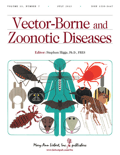
VECTOR-BORNE AND ZOONOTIC DISEASES
Advancing knowledge on the frontlines of infectious diseases.VECTOR-BORNE AND ZOONOTIC DISEASES is a prominent journal dedicated to advancing research in the fields of infectious diseases, microbiology, and virology, published by Mary Ann Liebert, Inc. With a rich history spanning from 2001 to 2024, this journal plays a critical role in disseminating cutting-edge research and insights regarding diseases transmitted by vectors and zoonotic pathogens. It has achieved notable rankings, including Q2 in the Infectious Diseases category and Q3 in both Microbiology and Virology as of 2023. The journal's emphasis on quality and relevance is further underscored by its established position—ranked 151st in Infectious Diseases and within the 43rd percentile in Virology according to Scopus. Although not an open-access journal, the publication ensures that its findings reach a broad audience of researchers, professionals, and students dedicated to tackling the challenges posed by these critical health issues. By providing a platform for innovative studies and discussions, VECTOR-BORNE AND ZOONOTIC DISEASES remains an essential resource for those at the forefront of disease research and public health strategies.

Journal of Global Infectious Diseases
Fostering knowledge sharing in the fight against infections.Journal of Global Infectious Diseases, published by Wolters Kluwer Medknow Publications, serves as a pivotal resource in the field of infectious diseases, offering insightful research and critical analyses that contribute to global health discourse. Since its inception as an Open Access journal in 2009, it has aimed to disseminate knowledge on various facets of infectious diseases, fostering collaboration among researchers, clinicians, and public health professionals. With an impact factor indicative of its growing significance—ranked in the Q3 category of Infectious Diseases for 2023—this journal publishes a diverse range of studies, from basic science to clinical applications. Its dedicated contributions help address pressing health challenges and enhance knowledge sharing in an era where infectious diseases pose significant threats worldwide. Based in India, the journal not only highlights regional health issues but also connects to the broader global landscape, making it an essential platform for anyone interested in advancing the field.

EcoHealth
Connecting Environmental Insights with Public HealthEcoHealth, published by Springer, is a premier academic journal at the intersection of ecology and health, dedicated to advancing our understanding of the interconnections between environmental conditions and human health. Established in 2004, the journal aims to contribute to the rapidly evolving field by publishing innovative research that addresses the complexities of socio-ecological systems. With an impressive impact factor reflecting its standing in the Q2 category for both Ecology and Health, Toxicology, and Mutagenesis, EcoHealth is highly regarded among researchers and practitioners alike. The journal’s inclusion in top-tier Scopus rankings—125th out of 461 in Environmental Science _ Ecology and 77th out of 148 in Environmental Science _ Health, Toxicology and Mutagenesis—further underscores its significance in the scientific community. EcoHealth is committed to facilitating open discussions and interdisciplinary collaboration, making it an essential resource for students, researchers, and professionals seeking to explore the critical linkages between ecological integrity and public health.
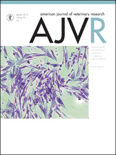
AMERICAN JOURNAL OF VETERINARY RESEARCH
Pioneering Research for a Healthier Animal FutureAmerican Journal of Veterinary Research, published by the American Veterinary Medical Association, serves as a cornerstone of the veterinary medical community, providing essential insights from 1945 to the present. With an ISSN of 0002-9645 and E-ISSN of 1943-5681, this esteemed journal focuses on a diverse range of topics within the veterinary field, contributing to the advancement of veterinary science through rigorous peer-reviewed research. Ranking in the Q2 category in Veterinary (miscellaneous) and Q3 in Medicine (miscellaneous) category as of 2023, it holds a respectable position in Scopus rankings, further emphasizing its impact in the field. While currently not an Open Access journal, its objective remains clear: to disseminate cutting-edge research that informs clinical practice and enhances animal health and welfare. The American Journal of Veterinary Research is invaluable for researchers, professionals, and students seeking to stay at the forefront of veterinary advancements and innovations.

Infectious Diseases of Poverty
Bridging the gap between infectious diseases and poverty alleviation.Infectious Diseases of Poverty, published by BMC, is a leading open-access journal dedicated to addressing the critical intersection of infectious diseases and poverty. Since its inception in 2012, this influential journal has contributed significantly to the fields of public health, infectious diseases, and environmental health. With impressive rankings placing it in the top quartile (Q1) across multiple categories—including Infectious Diseases and Public Health, Environmental and Occupational Health—it stands as a vital resource for researchers and practitioners alike. The journal's commitment to accessibility ensures that high-quality research is available to a global audience, fostering collaboration and knowledge sharing. Based in the UK, Infectious Diseases of Poverty aims to publish innovative research that sheds light on the complexities of infectious diseases and their socio-economic determinants, ultimately working to improve health outcomes in vulnerable populations around the world. With its robust impact factor and esteemed standing within the academic community, this journal serves as an essential platform for advancing the understanding and management of infectious diseases related to poverty.
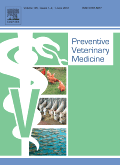
PREVENTIVE VETERINARY MEDICINE
Fostering collaboration between research and practice in veterinary medicine.PREVENTIVE VETERINARY MEDICINE, published by Elsevier, is a premier academic journal dedicated to advancing the field of veterinary science, with a particular focus on the prevention of diseases in food animals. With an impressive impact factor that reflects its stature in the academic community, this journal is categorized in the Q1 quartile across both Animal Science and Zoology and Food Animals categories, underscoring its significance in agricultural and biological sciences. Established in 1982, the journal is known for its rigorous peer-reviewed articles and research insights that contribute significantly to veterinary epidemiology, herd health management, and disease prevention strategies, fostering a closer connection between veterinary practitioners and researchers. By offering a platform for high-quality research that enhances animal health and productivity, PREVENTIVE VETERINARY MEDICINE serves as an essential resource for researchers, veterinarians, and students aiming to stay at the forefront of veterinary innovations and practices.
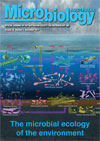
Microbiology Australia
Empowering Global Discourse in MicrobiologyMicrobiology Australia is a prominent journal published by CSIRO PUBLISHING, focusing on the diverse and rapidly evolving field of microbiology. Since its transition to Open Access in 2021, it has broadened its accessibility, fostering greater dissemination of research findings among scholars and practitioners. The journal features a range of topics that are pivotal for understanding microbial systems in applied microbiology, medical microbiology, public health, and environmental applications. Despite its current categorization in the Q4 quartile across several categories, it remains an essential platform for emerging research and innovative methodologies. Researchers and professionals can benefit from the journal's commitment to enriching the global discourse on microbiological advancements. With its ISSN 1324-4272 and E-ISSN 2201-9189, Microbiology Australia caters to a wide audience in Australia and beyond, making significant strides in bridging the gap between research and practical applications in microbiology.
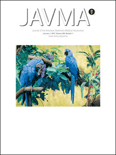
JAVMA-JOURNAL OF THE AMERICAN VETERINARY MEDICAL ASSOCIATION
Pioneering insights in veterinary medicine since 1945.JAVMA - Journal of the American Veterinary Medical Association, a leading publication in the field of veterinary medicine, has been a cornerstone of veterinary research and practice since its inception in 1945. Published by the American Veterinary Medical Association, this esteemed journal provides a vital platform for disseminating innovative studies, clinical findings, and advancements that enhance the welfare of animals and the practice of veterinary medicine. With an impressive impact factor reflecting its scholarly influence and a position in the top quartile (Q2) among veterinary journals, JAVMA is recognized for its rigorous peer-review process and high-quality content. Although the journal does not offer Open Access, it remains accessible through a variety of academic libraries and institutions, making it a crucial resource for researchers, veterinarians, and students dedicated to advancing the field. With a Scopus rank of #92 out of 194 in the general veterinary category, JAVMA is committed to fostering knowledge and discussions that shape the future of veterinary science.

Current Research in Parasitology & Vector-Borne Diseases
Fostering interdisciplinary dialogue in parasitology research.Current Research in Parasitology & Vector-Borne Diseases, published by ELSEVIER, is an influential journal dedicated to advancing the understanding of parasitology and vector-borne diseases. With an ISSN of 2667-114X, this journal is highly esteemed in the field, holding a prestigious Q1 quartile ranking in categories such as Animal Science and Zoology, Insect Science, and Parasitology, as well as a notable Q2 ranking in Virology for 2023. The journal's focus spans a crucial intersection of disciplines, offering a platform for innovative research that directly addresses global health challenges posed by parasites and vectors. Researchers benefit from its robust open-access model, which facilitates unrestricted dissemination of knowledge, making essential findings accessible to a wider audience. The journal continues to play a pivotal role in fostering scholarly dialogue and interdisciplinary collaboration within the scientific community, serving as a vital resource for professionals, students, and academicians interested in the dynamic and evolving field of parasitology.